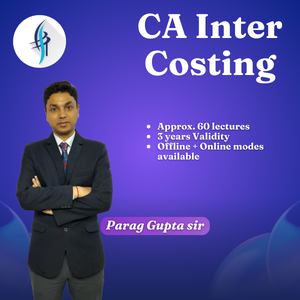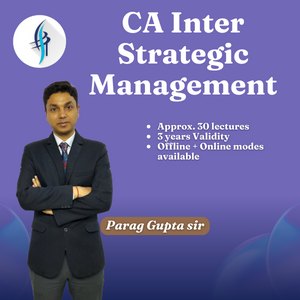CA Inter costing: last minute hacks to ace your exams by CA Parag Gupta Sir
CA Inter costing: last minute hacks to ace your exams by CA Parag Gupta Sir: The CA Intermediate Costing paper can be truly intimidating, to say the least, especially as the exam date draws nigh. Numerous students frequently ask themselves, “What exactly should I concentrate on? Which chapters should I focus on more?” This blog aims to assist you in being fully prepared for the CA Intermediate Costing paper by outlining the chapters that you need to know, the strategies, and some tips for getting a good grade.
1. Focus on key chapters first
When you are studying for the CA Intermediate Costing paper, certain chapters carry more weight and are indispensable for a good score. Let us begin with the most important ones:
Activity-based costing (ABC): This chapter is very significant. Be ready to answer the questions, as this is one of the most common topics that come out in the exam.
Marginal costing: A central chapter, Marginal Costing, would be the best concept to tackle the questions that want your deeper analysis and calculations.
Once you’re comfortable with these two, move on to the following chapters:
Material costing
Labor costing
Cost Sheet
Service sector costing
Standard costing
These chapters are also important but should be tackled after mastering activity-based and marginal costing.
2. Revise formulas in advance.
One of the simplest yet effective techniques for the CA Intermediate Costing paper is to focus on formula revision. The evening before your examination, attempt to write and remember all the vital formulas from your work. This is a final guarantee that you experience the pride of preparedness and eliminate the hectic practice of last-minute cramming.
As a result of this step, the probability of last-minute mistakes or confusion is reduced during the test. The purpose is to reach a point where you have become so competent that you would be able to recall all the formulas from memory on the night before the exam without looking at your notes. This recurring exercise will make the formulas preponderant in your mind, in turn, making you more competitive in the exam.
3. Stay hydrated and manage stress
Studies have shown that students who sit for the CA Intermediate Costing paper are usually under mental stress however, one of the best ways to recover is to stay well-hydrated and to effectively manage stress. Drink as much water as you can, get enough rest, and avoid stress. It will be an added bonus if your body is fresh and your mind is sharp during the test. This will help you do better.
4. Avoid last-minute cramming
There is a habit of students, which is to learn the whole of the CA Intermediate Costing paper in the last minute, which is the most important neglected point. It is the evening of the examination that you should overcome it by taking easy revisions, doing several workouts, and quickly reading through your notes. Do not attempt to pick up new ideas or chapters of a book at the examination night, rather, this will increase stress.
5. Believe in your preparation.
Ultimately, hark back to the diligence you have steeped in while studying for the CA Intermediate Costing examination. However, the well-organized, systematic approach, along with a focus on such key chapters, will enable you to face the exam with confidence. The deeper, peaceful, positive,, and motivating self-talk is what is being referred to when you say, “Stay calm, believe in yourself, and maintain a positive mindset!”
Need help? StudyByTech is here for you!
If you feel like you are lost or you have no idea what you are doing, do not worry because we are available at StudyByTech. StudyByTech is a new educational venture of CA Parag Gupta, a professional with 20 years of CA tutorship at both the intermediate and final levels. Being an ex-examiner, he provides information on exams that have helped hordes of students who went through them perfectly with flying colors.
Moreover, apart from access to the course’s video archives, the possibility of having the practice questions, and the opportunity to receive expert information for the CA Intermediate Costing examination, StudyByTech is the best option for students who desire clear, concise, and properly arranged study materials.
Conclusion
Although the CA Intermediate Costing paper would be quite a hard nut to crack, it will be a cinch if you adopt a smart approach. First, concentrate on the major sections like Activity-Based costing and marginal costing, and ensure to make the last memories of many of the important formulas the night before the exam. Keep hydrated, relax yourself, and do not cram the last minute.
And it is to be kept in your mind that StudyByTech is standing by to lend you high-quality learning materials and expert advice. Armed with quality preparation and the proper attitude, you will no doubt nail the CA Intermediate Costing paper!
Please do your best!
FAQ
The amount of time you need to study for the CA intermediate exams will depend on when you begin, but on average, you should dedicate 8 to 12 hours a day, or more, to succeed.
The chapters include Basic Costing Concepts, Costing Methods (Job, Contract, Batch), Cost Records, Cost Control & Reduction, Budgeting & Budgetary Control, Standard Costing & Variance Analysis, Marginal Costing & CVP Analysis, Activity-Based Costing, and Cost Audit.
Yes and no. If you are a first-timer and you have only 3 months in hand, you should attempt only one group. But, if you're planning to attempt both groups, 3 months won't be sufficient.
Focus on Activity-Based Costing (ABC) and Marginal Costing first, followed by Material Costing, Labor Costing, Cost Sheet, Service Sector Costing, and Standard Costing.
Stay hydrated, get enough rest, and manage stress through relaxation techniques. A calm mind performs better in exams.

